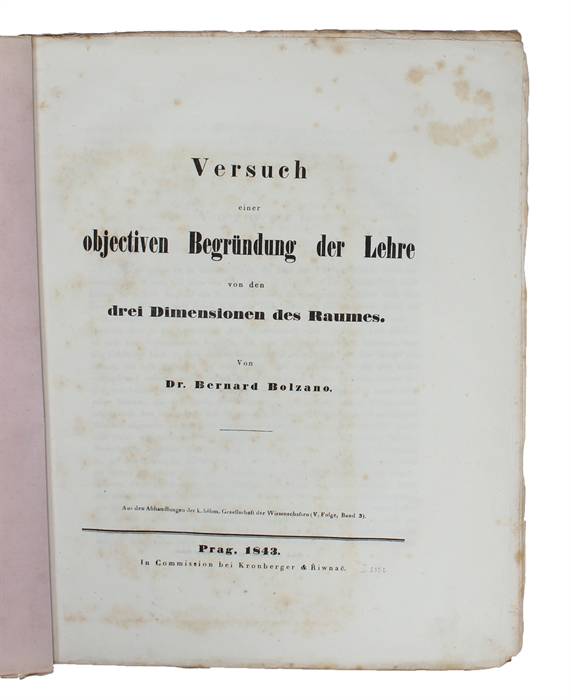BOLZANO'S FIRST WORK ON SPACE AND TIME
BOLZANO, BERNARD.
Versuch einer objectiven Begründung der Lehre von den drei Dimensionen des Raumes. (Aus dem Abhandlungen der k. böhm. Gesellschaft der Wissenschaften (V Folge, Bd. 3).)
Prag [Prague], 1843. 4to. Uncut in the original printed light pink wrappers, with a dicreet new black cloth back-strip. A bit of brownspotting and minor chipping to edges pf wrappers, but overall a very nice copy of this fairly fragile publication. 15, (1) pp.
The very rare first edition, off-print (separately paginated), of this important treatise on space and time, which constitutes an important part of Bolzano's philosophical-logical theory. The present paper constitutes the first public formulation of these controversial ideas on time and space, with which Bolzano sets out to establish a foundation of mathematics which is non-empirical.
By uniting mathematics and philosophy and applying both to the question of space and time, Bolzano here brings both sciences to a higher level of completeness, acknowledging that his theories depart from the those of Hegel, Kant, Schelling, etc.
As always, Bolzano grabs the essence of the question and the terms that he is treating and retraces the concepts that must be used, establishing their original inner connection. In the present paper, the question of space, time, and thought are treated in order to establish the precise and full nature of space, a theme which Bolzano had apparently been working on for many years but previously only discussed with a very small number of intimate acquaintances, and now publishes on for the first time.
The concept of space plays an important rôle in Bolzano's ontology and is closely linked to his mathematical and philosophical logic, in which the "space-position" plays a part in the demarcation of that which is purely mathematical and logical. Furthermore, for Bolzano, truth is constituted by true propositions (which state things as they are), and his canonical form of all propositions entails that "[a] proposition is true iff the object has the property (the attribute) which belongs to the subject of the proposition. Moreover, empirical propositions must contain determinations of space and time. Without these determinations, the sentence "It is snowing" has no truth value, it is just a propositional form which does not correspond to a complete proposition; "in order to be true, [such propositions] require the addition of such specifications as to time (and often place as well), 'It is snowing today, in this place'" (SEP).
Order-nr.: 41020


